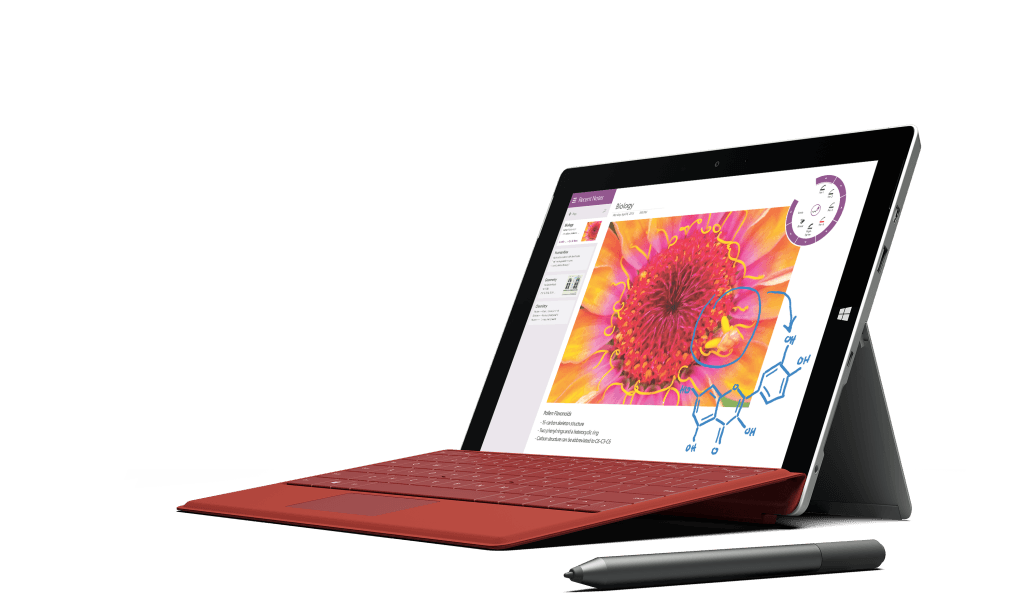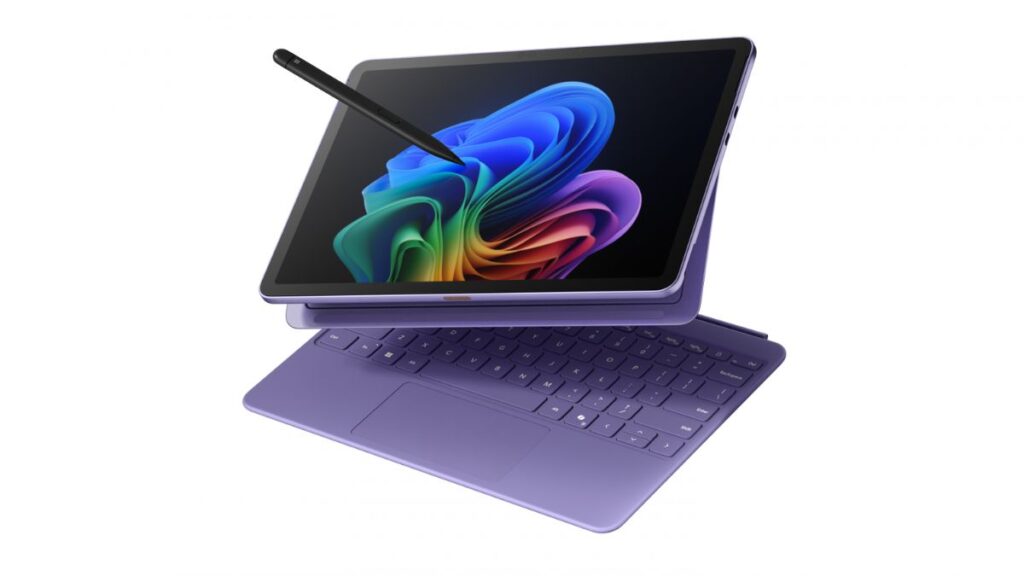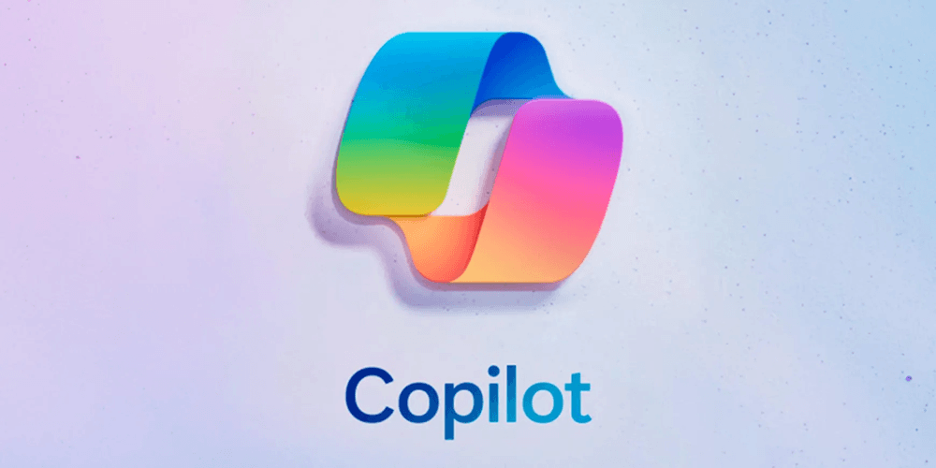Microsoft today revealed a new Surface tablet but it’s not the Surface Pro 4 many were expecting. Microsoft announced the new Surface 3—a completely re-imagined version of the Surface line that delivers on many of the features and improvements people expected from a Surface Pro 4.
When we conducted our survey of the TechSpective community a couple months ago the two things people wanted most were a lower price and longer battery life. Many also wanted a thinner, lighter tablet with 4G / LTE wireless capability. The Surface 3 delivers on all of that.
Surface 3 Specs
Surface 3 has a 10.8-inch full HD display with a maximum resolution of 1920 x 1280. The display is a 10-point multi-touch screen with a 3:2 aspect ratio.
The overall dimensions of the Surface 3 are 10.51 by 7.36 inches. The tablet is barely more than a third of an inch thick. The Surface 3 weighs just 1.37 pounds.
Inside it has a quad-core Intel Atom x7 processor. The Surface 3 is the first device to use this new Intel processor. It is designed for energy efficiency—running at 1.6GHz under normal conditions but capable of bursting to 2.4GHz when the demand increases.
It has a full-sized USB port on the side, mini DisplayPort, and a microSD memory card slot behind the kickstand just like the Surface Pro 3. With the Surface 3 Microsoft has opted to use the semi-standard micro USB for charging—meaning you will be able to charge the tablet virtually anywhere because micro USB cables are virtually ubiquitous.
Surface 3 comes with 802.11ac Wi-Fi and Bluetooth 4.0 low energy wireless connectivity. More (maybe most) importantly, Microsoft is now offering a Surface 3 model with a SIM card slot for 4G / LTE wireless service.
There is an 8 megapixel rear-facing autofocus camera and a 3.5 megapixel front-facing camera. Both cameras are capable of 1080p video. It also has an ambient light sensor, proximity sensor, accelerometer, gyroscope, magnetometer, and digital compass. The 4G / LTE models will also have GPS, assisted GPS and GLONASS functionality.
Surface 3 comes with Windows 8.1 and Microsoft claims the battery is capable of 10 hours of video playback—so you can watch the entire Hobbit trilogy on a single charge.
It uses a Surface Pen but the device is sold as an optional accessory with the Surface 3. There are also Type keyboard covers designed for the smaller size of the Surface 3 and a new docking station.
Surface 3 will come with 2GB RAM and a 64GB SSD starting at $499. There will also be a model that doubles the RAM and storage (4GB RAM and 128GB SSD) for $100 more. The 4G / LTE versions will be $100 more than their non-4G / LTE siblings–$599 and $699 respectively.
Surface 3 Benefits and Accessories
Surface 3 is the thinnest, lightest Surface tablet Microsoft has made so far, and at $499 it puts the Surface line in reach of a much wider audience. Unlike the original Surface RT and Surface 2 line, the Surface 3 does not run on an ARM processor and it doesn’t use a limited or scaled down version of Windows. You get the full Windows 8.1 operating system capable of running all of your legacy Windows applications.
That means Surface 3 can also run the full Microsoft Office suite, which brings me to a significant value of the Surface 3: the price includes a one-year subscription to Office 365 Personal. That is a $70 value that lets you install the full Office 2013 Professional suite—and will allow you to upgrade for free to Office 2016 Professional once it’s released later this year. It also includes unlimited cloud storage on OneDrive, Skype calling minutes, and access to the full features and capabilities of Office from iOS and Android mobile devices.
The Intel Atom x7 processor allows the Surface 3 to be more energy efficient, which translates to running cooler as well. That enables the Surface 3 to be completely fanless, which contributes to how thin the tablet is and allows it to run completely silent.
With the Surface 3 Microsoft has made the Surface Pen an optional accessory that now comes in six different colors to match the keyboard covers. That is actually a move I agree with to some extent. Some people use the Surface Pen extensively. I rarely use it. The Surface Pen is $50 so that is $50 I’d rather remove from the cost of Surface 3 and make it optional for those who want it.
Unfortunately, the Type keyboard cover is still an optional accessory as well. It still costs $130 but since I don’t really consider it optional it makes the entry-level Surface 3 price $630 in my mind. I would still rather see Microsoft bundle the Type keyboard cover by default and just charge $100 more for the tablet since the Type keyboard cover is required to deliver on the “tablet that can replace your laptop” promise.
There is also a docking station engineered specifically for the Surface 3 that costs $200. The docking station isn’t quite as critical as the Type keyboard cover, but it is a necessity for me. I spend about half my time with the Surface Pro 3 in the docking station connected to a full-size monitor, keyboard, touchpad, etc.
Surface 3 Value
The Surface 3 is not for people who are doing 3D modeling or CAD/CAM type engineering on their PC. For normal computer use, however—email, social networking, Web surfing, etc.—the Intel Atom x7 processor delivers essentially the same performance as the current Surface Pro 3. I spoke with Dennis Meinhardt, Director of Program Management for Surface last week and he told me he has been using the Surface 3 as his primary PC for a while now and doesn’t notice any impact to performance.
All in all, the Surface 3 is a brilliant move for Microsoft. It takes the best elements of the Surface line—lower cost and silent operation—and merges them with the elements consumers want and need from the Surface Pro line—more powerful computing and the full Windows OS experience.
The Surface 3 provides essentially the same functionality and features as the Surface Pro 3 in a thinner, lighter, fanless device with better cameras and better battery life for $300 less than the entry-level Surface Pro 3 model. Oh—and you get Office 365 Personal thrown in, so it’s sort of like you’re only paying $430 for the Surface 3.
I would still recommend getting the more powerful Surface 3 with 4GB of RAM and 128GB SSD for $599, and I’d probably also add a 128GB microSD memory card for about $100. It is not a direct or even comparison, but that would bring the cost to $700 but that is still only about half of what an equivalent Surface Pro 3 costs.
As soon as we can get some hands-on experience with an actual Surface 3 we’ll update you to let you know if the device really delivers all that Microsoft claims. If it does, though, Surface 3 hits the sweet spot for what consumers need.
- Why Data Security Is the Real AI Risk - June 30, 2025
- Why Being Bold Matters in Cybersecurity—and Branding - June 3, 2025
- Gear Tested and Approved: My Top Picks for Dads and Grads This Season - May 28, 2025




Is there any word if WiGig and NFC are enabled?
Oh no 512gb LTE model? Guess won’t be swapping out my current 512gb Surface Pro 3
I have, for the most part, steered clear of Atom processors, preferring something with a little more oomph. I just have to decide if the extra oomph I want is worth the extra quatloos of the Pro 3.
For people who use the Surface in their lap, I’d agree that the Type Cover is essential. For those who rarely use it that way if ever, I’d actually recommend something like the ThinkPad compact bluetooth keyboard. It’s a far superior typing experience and I really like the trackpoint. The downside is that it doesn’t have backlit keys.